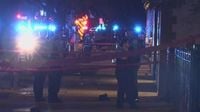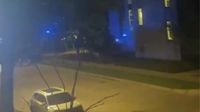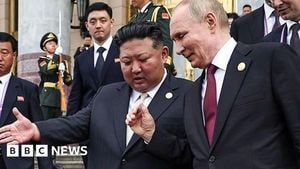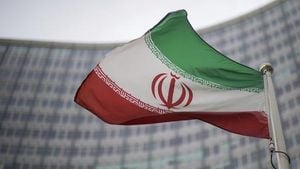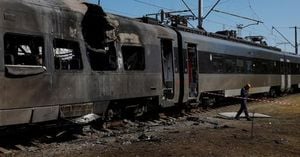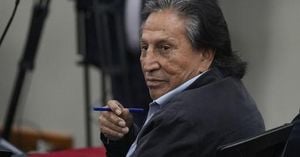On the night of August 31, 2025, the familiar hum of late-summer activity in Chicago’s Bronzeville neighborhood was shattered by a burst of gunfire. According to police reports cited by WLS, a drive-by shooting erupted at approximately 11:10 p.m. in the 3500-block of South State Street, where a large crowd had gathered. Within moments, chaos replaced celebration, as seven people—five men and two women—were struck by bullets in a sudden, violent attack.
Witnesses described a car speeding past the crowd, with at least one individual inside pulling out a weapon and opening fire. The shooters, described by police as multiple unknown male offenders in an unidentified vehicle, quickly vanished into the night, leaving behind a scene of confusion and fear. The victims, aged between 28 and 32, suffered gunshot wounds to the legs, thighs, knees, feet, and buttocks, according to details provided by Times Now News and NBC Chicago.
Despite the violence, there was a small measure of relief: all seven victims survived. As Chicago police confirmed, each was transported to area hospitals and listed in good condition. The injuries, though serious, were not life-threatening—a fact that likely prevented the incident from becoming an even greater tragedy.
“All victims were taken to area hospitals and are expected to be OK,” police told WLS. The specifics of their injuries were later detailed: a 28-year-old woman was shot in the left thigh, a 30-year-old woman in the right knee, a 30-year-old man in the right leg, another 30-year-old man in the left thigh, a 31-year-old man in the left foot, a 32-year-old man in the left thigh, and a 28-year-old man in the buttocks.
The scene, cordoned off with police tape and flashing blue lights, became a stark reminder of Chicago’s ongoing struggle with gun violence. As Times Now News noted, this was just one of many shootings that erupted across the city during the Labor Day weekend. In fact, at least five people were killed and 31 others wounded in shootings between Friday night and Sunday morning—a grim tally that underscores the persistent challenges facing law enforcement and city officials.
Area One detectives, tasked with investigating the Bronzeville shooting, worked through the night and into Sunday morning. Yet as of September 1, no suspects were in custody. The shooters remained at large, their motives unclear. Police have urged anyone with information to come forward, but community trust in law enforcement remains fragile—a recurring theme in neighborhoods burdened by repeated cycles of violence.
“Nobody is in custody,” police reiterated to WLS and NBC Chicago. The lack of immediate arrests is not unusual in such cases, where witnesses may be reluctant to speak or where suspects slip away before authorities arrive. Still, the ongoing investigation, led by Area One detectives, signals the city’s determination to bring those responsible to justice.
The Bronzeville incident was not an isolated event. According to Times Now News, a separate drive-by shooting in Humboldt Park around 1:11 a.m. on Sunday injured at least four more people. In that case, several men opened fire from two vehicles, again targeting a group and then fleeing the scene. All four victims were expected to recover, but the attack added to a growing sense of unease across the city.
Chicago’s Labor Day weekend, typically a time for family gatherings and community celebrations, was instead marked by violence. The first shooting of the weekend occurred Friday night, when a 43-year-old man was shot in the leg during an argument. Hours later, two women were shot in an apartment building on South Essex Avenue—one fatally. The violence continued into Saturday and Sunday, with victims ranging in age from 17 to 46, according to police data cited by Times Now News.
For residents of Bronzeville, the drive-by attack was particularly jarring. The neighborhood, rich in history and culture, has long been a symbol of African-American achievement and resilience. Yet it has also been shaped by decades of disinvestment, economic hardship, and—too often—gun violence. Community leaders have repeatedly called for more resources, better policing, and investment in youth programs to address the root causes of such attacks.
The scale and frequency of the weekend’s shootings have reignited debates among city leaders and residents about how best to stem the tide of violence. Some advocate for stricter gun control measures, pointing to the ease with which firearms find their way into the hands of young men. Others argue for more robust community interventions, mental health services, and job opportunities as a means of breaking the cycle.
“We need more than just police presence,” said one community organizer, echoing a sentiment heard often in Chicago’s hardest-hit neighborhoods. “We need hope, opportunities, and a reason for people to believe things can get better.”
Meanwhile, police continue to urge vigilance and cooperation. Area One detectives are reviewing surveillance footage, canvassing for witnesses, and following up on leads. The investigation remains active, but the lack of arrests so far has left some residents frustrated and fearful that the perpetrators may strike again.
According to NBC Chicago, the victims of the Bronzeville shooting were fortunate to survive. But the psychological toll of such violence lingers long after the ambulances have departed and the police tape is removed. For many, the shooting was a reminder of both the city’s resilience and its vulnerabilities—a community determined to heal, but still searching for answers.
As Labor Day weekend drew to a close, Chicagoans reflected on a holiday marred by tragedy. The drive-by shooting in Bronzeville stood out as one of the largest incidents of the weekend, but it was far from the only one. Across the city, families mourned lost loved ones, tended to the wounded, and wondered when—if ever—the violence would end.
For now, the investigation continues, and the city braces for what comes next. The hope, as always, is that justice will be served and that future holidays will be remembered for celebration, not sorrow.
